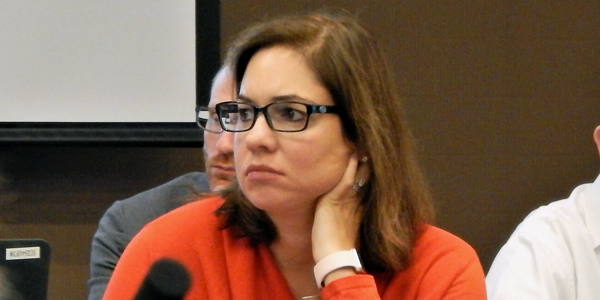By Tom Kleckner
LITTLE ROCK, Ark. — Kansas City Power & Light is making good on its promise to take legal action against SPP for how the RTO allocates costs to network customers after a new transmission owner joins an existing transmission zone.
The utility has joined with 11 other TOs to file a Section 206 complaint with FERC against a “loophole” in SPP’s Tariff that forces customers within an existing zone to pay a share of the legacy costs for transmission lines newly integrated into the zone. That practice, the complainants say, runs counter to the “no legacy cost shift” protections SPP has established to prevent cost shifting between zones.
The Oct. 13 complaint says SPP’s Tariff is unjust and unreasonable and suggests the RTO modify its rules to ensure that facility costs are borne by customers for whom the facilities were planned.
Joining with KCP&L are American Electric Power (on behalf of subsidiaries Public Service Company of Oklahoma and Southwestern Electric Power Co.); City Utilities of Springfield, Mo.; KCP&L Greater Missouri Operations; Nebraska Public Power District; Oklahoma Gas & Electric; Omaha Public Power District; Southwestern Public Service (SPS); Sunflower Electric Power; Mid-Kansas Electric; Westar Energy; and Western Farmers Electric Cooperative.
The companies contend SPP’s zonal integration decisions create unjustified rate increases in the form of cost shifts between customers. Their complaint says the Tariff is unduly discriminatory because the cost shift burden is not evenly distributed and the disparate rate treatment is not based on any differences in service or the customers.
The cost shifts are contrary to FERC’s policies on transmission pricing, cost allocation and RTO membership, the utility said.
Fairness Issue

“This is a fairness issue,” said KCP&L’s Denise Buffington, the utility’s director of energy policy and corporate counsel. “You should not decouple the costs from the decision to build for a specific set of customers.”
The recent creation or expansion of multi-owner zones has highlighted various notice and equity issues that did not exist in historical single-owner zones, Buffington said. She suggested modifying SPP’s license plate rate design to address the increasingly common integration of smaller TOs into existing zones.
Buffington first introduced a Tariff revision request in 2016 to address the gap she said exists between the zonal placement decisions for new TOs and the cost effects of those decisions.
After receiving pushback from SPP and members, she revised her proposal to establish a mechanism holding customers of an existing zone harmless from network integration transmission service (NITS) rate increases of more than 2% or $1 million (whichever is lower). The Markets and Operations Policy Committee and the Board of Directors rejected the proposal in July. (See SPP Board Rejects Changes to Tx Zonal-Placement Rules.)
“You can be sure it will be argued about at FERC,” Buffington warned at the time.
The complaint suggested to FERC that SPP maintain separate NITS rates for the new and existing TOs upon integration. Customers of the new entity would pay its annual transmission revenue requirement (ATRR), and customers of the existing TO would continue paying the same rate previously paid based on the existing ATRR.
Public power entities have consistently opposed the transmission-owning members’ suggestions, saying it would discourage smaller entities from building transmission and getting cost recovery. FERC is already considering several cases involving cost shifts (ER16-204, ER17-2020).
“We’re still reviewing the 87-page filing, but it appears similar to the proposal KCP&L made in the SPP stakeholder process … and addresses a topic already under review by FERC,” said Brett Hooton, vice president of South Central MCN, which is involved in one of the dockets. “The proposal included in the complaint is discriminatory, anti-competitive, and undoubtedly unjust and unreasonable.”
The Missouri Public Service Commission on Monday intervened in the docket (EL18-20).
Z2 Complaints
Also last week, Xcel Energy on Oct. 10 filed a Section 206 and 306 complaint against SPP on behalf of SPS, its Texas-based utility. The complaint said SPP had violated its Tariff by assessing Attachment Z2 credit payment obligations to SPS in a manner that is “inconsistent with the SPP Tariff, violates the filed rate doctrine, is inconsistent with SPS’ network transmission service agreements with SPP and is otherwise unjust.”
Xcel requests that FERC find as unjust and unreasonable SPP’s $12.8 million net assessment to SPS for historical revenue credit payment obligations (CPOs) and ongoing monthly charges of approximately $485,000 for current CPOs and amounts uplifted. The company is seeking to have SPP recalculate the CPOs for SPS’ transmission service reservations, recalculate the historic and ongoing Z2 charges, and provide refunds to SPS with interest.
KCP&L, American Electric Power and Westar Energy have all intervened in the proceeding (EL18-9).
SPP’s process for assigning financial credits and obligations for sponsored upgrades under Attachment Z2 of its Tariff has bedeviled the RTO and members for almost two years. Last year staff identified about $200 million in revenue credits to be collected for transmission upgrades under its Tariff’s Attachment Z2, which details how to reimburse network upgrade sponsors. The bills covered eight years of credits and obligations for 2008-2016, when staff failed to apply credits, complicating the task of trying to accurately compensate project sponsors and claw back money from members with debts for the upgrades. (See “Z2, Two Other Task Forces Expire,” SPP Board of Directors/Members Committee Briefs: July 25, 2017.)





